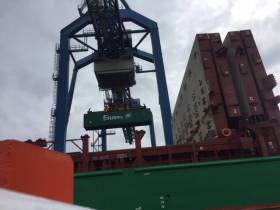Displaying items by tag: Trading Update
Irish Ferries Owner, Irish Continental Group Report Lower Revenues So far this Year
The operator Irish Ferries which is owned by parent company, Irish Continental Group (ICG) has issued a trading statement today which reported of a dip in revenues but increased volumes of passengers and freight levels.
The Dublin based ferry, shipping transport operator, said its consolidated group revenue fell by 1.8% to €491.4m in the year to 18 November when compared to the same timeframe last year, reports The Irish Times.
The group’s ferry division of UK land-bridge routes and a Ireland-France link, recorded a rise in car volumes by 12.2% to 588,700 when compared to 524,700 in the same time of last year, while Ro-Ro freight volumes increased by 3.9% to 639,900 from 616,100.
ICG said it had been impacted by the weak deep-sea market in the first half of the year, which resulted in a material drop in volumes in its container and terminals, Afloat highlights the container brand (Eucon) and Lo-Lo terminals of Dublin Ferryport Terminals (DFT) and the Belfast Container Terminal (BFT).
The results from the trading update, they cited to a continued weak export and import levels in markets with China, the continued effect of over-stocking following the Covid-19 pandemic. In addition, subsequent supply chain difficulties coupled with the slowdown in world economic growth.
"Our flexible business model has allowed us to adjust our shipping capacity to match the current demand situation," it added.
Containership Fleet in Irish Continental Group (ICG) Rises to Six
Dublin based Irish Continental Group (ICG) has brought its sixth containership.
The shipowner and ferry operator, reports Tradewinds, has acquired the 974teu CT Rotterdam (built 2009), for an undisclosed price.
Afloat adds that the container vessel was preceeded by another acquisition in April as outlined further below.
On Wednesday the Group released a trading update which saw increased revenue in its passenger /freight division, Irish Ferries.
According to the trading update, in April an acquisition took place of the Thetis D. Afloat can reveal the lo-lo vessel has a capacity for 1421teu. The containership was built in 2009 likewise of the aforementioned CT Rotterdam which was acquired this month.
The group's Container & Terminal Division includes lo-lo shipping activities under the Eucon brand and the operation of two container terminals, Dublin Ferryport Terminals (DFT) and Belfast Container Terminal (BCT).
The trading update for this division, revealed a total revenue volume of €131.0 million in the period to 31 October, this was a 9.1% increase on the previous year. For more on the performance of this sector as part of the Group's overall trading update can be read by clicking here.





























































